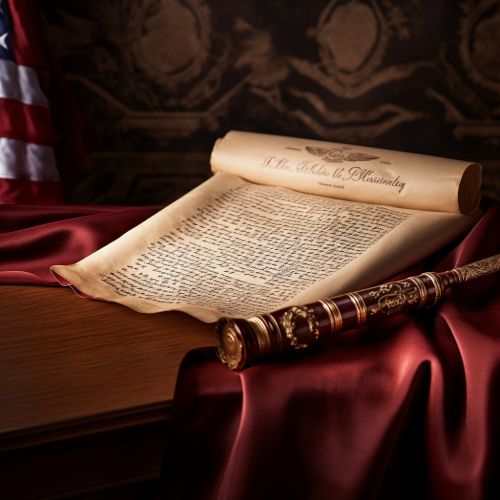Bill of Rights
Origins and Development
The Bill of Rights is a cornerstone of American constitutional law, comprising the first ten amendments to the U.S. Constitution. These amendments were ratified on December 15, 1791, and embody a series of protections for individuals against potential infringements by the federal government.
Madison, the principal architect of the Bill of Rights, was influenced by the Virginia Declaration and the philosophical writings of Locke and Montesquieu. The Bill of Rights was created to address the objections raised by the Anti-Federalists during the ratification of the Constitution. They feared that without such protections, the strong central government would trample individual liberties.

Content and Structure
The Bill of Rights comprises ten amendments, each addressing different aspects of civil liberties and governmental power.
First Amendment
The First Amendment guarantees the freedom of speech, religion, press, assembly, and petition. It prohibits the government from establishing a religion and interfering with the free exercise thereof. It also protects the freedom of speech and of the press, allowing citizens to express their opinions without fear of governmental retribution.
Second Amendment
The Second Amendment protects the right of the people to keep and bear arms. This amendment has been the subject of intense debate over its interpretation, with some viewing it as protecting an individual right, while others see it as protecting a collective right related to service in a militia.
Third through Eighth Amendments
The Third Amendment prohibits the quartering of soldiers in private homes without the owner's consent, a reaction to the practices of British soldiers during the colonial era. The Fourth through Eighth Amendments provide protections for those accused of crimes, including protection from unreasonable searches and seizures, the right to a speedy and public trial, and protection from cruel and unusual punishment.
Ninth and Tenth Amendments
The Ninth Amendment states that the enumeration of certain rights in the Constitution does not deny or disparage others retained by the people. The Tenth Amendment reserves powers not delegated to the United States by the Constitution, nor prohibited by it to the states, to the states respectively, or to the people.
Interpretation and Impact
The interpretation of the Bill of Rights has evolved over time, shaped by judicial review, legislation, and societal changes. The Supreme Court plays a crucial role in this process, interpreting the Constitution and the Bill of Rights in numerous landmark cases.
The Bill of Rights has had a significant impact on American society and has influenced constitutional law worldwide. It has been invoked in countless legal cases and policy debates, shaping the nation's understanding of fundamental civil liberties and defining the limits of governmental power.
See Also
Fourteenth Amendment Civil Rights Act of 1964 United States Constitution
